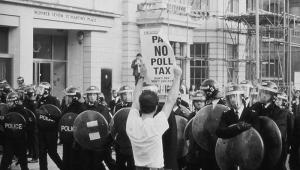The tax is “outdated, regressive, and, despite being notionally based on the value of homes, functions in many ways like a poll tax [which it replaced],” the think-tank warned.
There is a “strong case for considering a complete overhaul and replacement of council tax with a proportional property tax,” the Home Affairs report recommended.
“Council tax is only weakly linked to property values and has failed to capture changes in these over time,” the analysis added. “This approach is highly regressive”.
A flat charge of 0.5% per year levied on more up-to-date house prices would raise £1.6m a year compared to council tax, the Resolution Foundation concluded.
It also suggested another option of reforming the current council tax system, such as emulating changes in Scotland where tax has been increased for higher council tax bands, or introducing a limited ‘mansion tax’.
The report highlighted various ways in which the council tax resulted in “regional and distributional inequities on average” and was responsible for “severe injustices”.
These included where there are wide bands in which council tax is levied, which meant people living in much lower priced properties [in the lower section of a band] will be paying the same council tax as people in houses of much higher value [in the upper section of a band].
The report authors Adam Corlett and Laura Gardiner also criticised the small gaps between bands, which meant median gross council bills in Great Britain in 2015-16 were only 3.3 times higher for the most expensive homes in band H (£2,595) than for the cheapest in band A (£775).
The report noted council tax bands were based on property values that were “27 years out of date (15 in Wales)” and regional variations in council tax rates “drive much lower effective council tax rates in the South of England than elsewhere”.
The Resolution Foundation suggested young families were being disproportionately affected, with 85% of households in their 20s living in the bottom three council tax bands - which have the highest effective tax rates, up from 79% two decades earlier.
Gardiner, a principal researcher at the Resolution Foundation, said: “The council tax you pay is meant to be tied to the value of the property you live in but when someone living in a property worth £100,000 pays a tax rate five times higher than someone living in a property worth £1m, something has gone seriously wrong.”
The report also suggested reducing residential stamp duty by raising the tax-free threshold from £125,000 to £925,00, which the think-tank estimates would cost £5.2bn.
Another recommendation was putting the onus onto landlords to pay council tax, rather than tenants, which might raise rent for tenants but could reduce the “administrative burden” of council tax as landlords were “fewer in number and change less frequently”.











